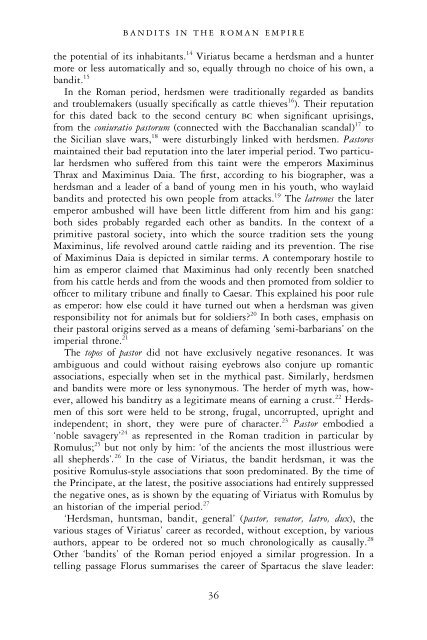Create successful ePaper yourself
Turn your PDF publications into a flip-book with our unique Google optimized e-Paper software.
BANDITS IN THE ROMAN EMPIRE<br />
the potential of its inhabitants. 14 Viriatus became a herdsman and a hunter<br />
more or less automatically and so, equally through no choice of his own, a<br />
bandit. 15<br />
In the Roman period, herdsmen were traditionally regarded as bandits<br />
and troublemakers (usually specifically as cattle thieves 16 ). Their reputation<br />
for this dated back to the second century bc when significant uprisings,<br />
from the coniuratio pastorum (connected with the Bacchanalian scandal) 17 to<br />
the Sicilian slave wars, 18 were disturbingly linked with herdsmen. Pastores<br />
maintained their bad reputation into the later imperial period. Two particular<br />
herdsmen who suffered from this taint were the emperors Maximinus<br />
Thrax and Maximinus Daia. The first, according to his biographer, was a<br />
herdsman and a leader of a band of young men in his youth, who waylaid<br />
bandits and protected his own people from attacks. 19 The <strong>latrones</strong> the later<br />
emperor ambushed will have been little different from him and his gang:<br />
both sides probably regarded each other as bandits. In the context of a<br />
primitive pastoral society, into which the source tradition sets the young<br />
Maximinus, life revolved around cattle raiding and its prevention. The rise<br />
of Maximinus Daia is depicted in similar terms. A contemporary hostile to<br />
him as emperor claimed that Maximinus had only recently been snatched<br />
from his cattle herds and from the woods and then promoted from soldier to<br />
officer to military tribune and finally to Caesar. This explained his poor rule<br />
as emperor: how else could it have turned out when a herdsman was given<br />
responsibility not for animals but for soldiers? 20 In both cases, emphasis on<br />
their pastoral origins served as a means of defaming ‘semi-barbarians’ on the<br />
imperial throne. 21<br />
The topos of pastor did not have exclusively negative resonances. It was<br />
ambiguous and could without raising eyebrows also conjure up romantic<br />
associations, especially when set in the mythical past. Similarly, herdsmen<br />
and bandits were more or less synonymous. The herder of myth was, however,<br />
allowed his banditry as a legitimate means of earning a crust. 22 Herdsmen<br />
of this sort were held to be strong, frugal, uncorrupted, upright and<br />
independent; in short, they were pure of character. 23 Pastor embodied a<br />
‘noble savagery’ 24 as represented in the Roman tradition in particular by<br />
Romulus; 25 but not only by him: ‘of the ancients the most illustrious were<br />
all shepherds’. 26 In the case of Viriatus, the bandit herdsman, it was the<br />
positive Romulus-style associations that soon predominated. By the time of<br />
the Principate, at the latest, the positive associations had entirely suppressed<br />
the negative ones, as is shown by the equating of Viriatus with Romulus by<br />
an historian of the imperial period. 27<br />
‘Herdsman, huntsman, bandit, general’ (pastor, venator, latro, dux), the<br />
various stages of Viriatus’ career as recorded, without exception, by various<br />
authors, appear to be ordered not so much chronologically as causally. 28<br />
Other ‘bandits’ of the Roman period enjoyed a similar progression. In a<br />
telling passage Florus summarises the career of Spartacus the slave leader:<br />
36


